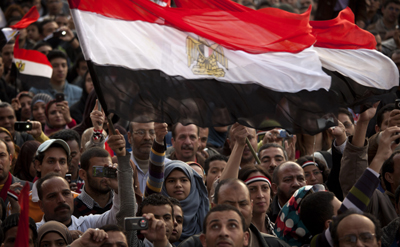New York, February 9, 2011–Egyptian authorities are obstructing international news coverage of the country’s political crisis by withholding press credentials and, in one instance, invading the home of a foreign journalist, the Committee to Protect Journalists said today. A well-known Egyptian blogger also remains unaccounted for after being seized by suspected government agents earlier this week.
After an unprecedented assault on the press last week, anti-press attacks and detentions have been subsiding since the weekend, CPJ tracking has found. But numerous journalists have reported an ongoing government effort to obstruct and intimidate them.
Since Sunday, uniformed military personnel have confiscated press credentials, and in some cases cameras and other equipment, from foreign journalists reporting from Cairo, CPJ research shows. Multiple journalists told CPJ they were instructed to seek what was called “temporary accreditation” from the Ministry of Information.
But CPJ has found no evidence the government is actively granting such “temporary accreditation.” CPJ has spoken to 10 foreign journalists, none of whom had been granted the new accreditation.
NPR’s Suzanna George told CPJ that she and her NPR colleagues applied for temporary accreditation two days ago and were told the credentials would be issued today. But today they were told that the process was ongoing and that they could pick up their accreditation at 8 p.m.–when a curfew would preclude them from obtaining it. Journalists, she said, “were waiting in the press room all day” at state broadcast headquarters. “We don’t know what to do, and we are not able to report.”
Separately, CPJ sources said military police burst into the apartment of an international journalist on Tuesday, searched the residence, and confiscated journalistic materials. CPJ is withholding the journalist’s identity out of concern that government forces may take further retaliatory measures.
The whereabouts of at least one local blogger also remained unknown today. Bloggers and lawyers told CPJ that people believed to be government agents detained Abdel Karim Suleiman–known online as Karim Amer–early Monday morning in Cairo. Amer had completed a four-year prison sentence on charges of insulting Islam and President Hosni Mubarak in late 2010. During his years in captivity, Amer was repeatedly abused by prison guards and inmates.
CPJ research shows that other detained journalists, both local and international, have been released in recent days.
“The authorities say everything is being done to protect journalists, but reports of harassment and intimidation continue,” said Mohamed Abdel Dayem, CPJ’s Middle East and North Africa program coordinator. “Shifting from a tactic of outright violence against journalists to one of erecting bureaucratic obstacles is not fooling anybody. Cairo must allow all journalists to report unhindered.”
In other developments, more than 500 Egyptian media professionals condemned the crudely propagandist coverage of the uprising in state-controlled media. In a statement issued on Tuesday, they denounced “what has been done by print, visual, and audio media of falsifying truth, lying, and tarnishing the image of the people who seek freedom and progress for this country.” On Monday and Tuesday, journalists at the state-controlled Al-Ahram and Rose al-Youssef publicly demanded that top editors and managers step down immediately. In addition, a throng of Egyptian Journalists’ Syndicate members surrounded the group’s leader, Makram Mohamed Ahmad, a Mubarak supporter, and drove him out of the building on Tuesday. Footage was posted on YouTube.
In all, CPJ has documented at least 141 direct attacks on journalists and news facilities since January 30, and is investigating numerous other reports. For details on cases, see our daily coverage:
